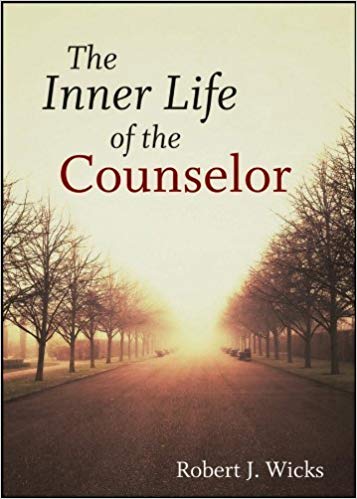
Over the past few decades Dr. Robert Wicks noticed an uptick in the promotion of mindfulness and positive psychology among counselors.[1] While helpful, these concepts seemed to ignore the “wisdom literature of world spiritualities”[2] that addressed the same concerns long before the rise of modern psychological movements. Accordingly, Wicks decided to write the book The Inner Life of a Counselor to “provide encouragement to professional helpers”[3] to let go of the nonessentials while embracing a greater focus on mindfulness and engaging in practices that enhance a healthy perspective of life no matter what is happening around them.[4]
Though I found myself enjoying and agreeing with the all practices promoted by Wicks, it was the concept of humility that found fertile ground in my soul. Wicks defines humility as “the ability to fully appreciate our innate gifts and our current ‘growing edges’ in ways that enable us to learn, act, and flow with our lives as never before.”[5] As someone with a high ‘learner’ and ‘input’ theme on the CliftonStrengths assessment,[6] I have a desire to seek information which can lead to a paralysis of action due to my appetite for knowledge. Paradoxically, these same strengths can cause me to assume I know something when I really don’t. By adopting a “sense of equanimity”[7] through humility, the hope is that I can learn to appreciate the growing edge of my desire to learn while also embracing the reality that I don’t have to know everything.
The words of Zen Master Shunryu Suzuki as retold by Wick were of special importance to me. In the retelling, Shunryu Suzuki told his disciples that they were “all perfect as [they] are” though they “could all use a little improvement.”[8] This struck me as echoing Jesus of Nazareth who loved people where they were while also calling them forward into a new way of life (e.g. John 8:1-11, Luke 19:1-10). To do this, though, we must be willing to unlearn what we know. As Wicks states in his book, “wisdom comes about when we take knowledge and add humility, but humility is not possible without a willingness to unlearn so something new can be entertained – even about concepts, themes, and philosophies of living that we have known well in the past.”[9] It is giving up a ‘perfect’ life in exchange for another that is also ‘perfect’ that may, in the future, be exchanged for yet another as the Spirit of the Breath of Life transforms us into the image of Jesus “with ever-increasing glory” (2 Corinthians 3:18, NIV).
In his novel The Pickwick Papers, Charles Dickens notes that a horse hitched to a cab is quite often not pulling the cab but running from it. In reflecting on this passage, Metropolitan Anthony Bloom commented that often “we are the horse that runs away from the cab in fear of its life.”[10] If we don’t regularly stop and humbly review our inner thoughts and beliefs, they can capture “our hearts and drive us on”[11] to places that we ought not go. Hence Wicks’ suggestion to create space in our lives to sit in silence and solitude so that the “irrational but as-yet-undisputed thoughts about ourselves and the world”[12] will surface. Once they have surfaced, we can then face and process through them as we grow in humility and self-awareness.
Commonly when in a ministry situation, whether in a
formal counseling session or not, I find myself feeling very inadequate for the
task at hand. No matter what education I have or how much information I have accumulated,
I find myself at a loss in what I am supposed to do. In thinking about the
concept of humility, I feel that it might give me the freedom to be with the
person in need without having to have all the answers. It is an acceptance and recognition
of my “growing edges, defenses, overinvolvement in [my] own ego, and
characterological styles.”[13]
At the same time, humbly accepting myself as I am means that I can continue on
my journey of personal improvement and information gathering so that I might
have a response, that, while maybe not ‘correct’ per se, would be of benefit to
the person of concern. It is a both/and concept of being comfortable with the
tension of knowing and not-knowing.
[1] Robert J. Wicks, The Inner Life of the Counselor (Hoboken, New Jersey: John Wiley & Sons, Inc., 2012), x.
[2] Robert J. Wicks, The Inner Life of the Counselor, x.
[3] Robert J. Wicks, The Inner Life of the Counselor, x.
[4] Robert J. Wicks, The Inner Life of the Counselor, x-xi.
[5] Robert J. Wicks, The Inner Life of the Counselor, 8.
[6] CliftonStrenghts, “Understand how your talents work with others”, Accessed on March 23, 2019. https://www.gallupstrengthscenter.com/home/en-us/cliftonstrengths-themes-domains.
[7] Robert J. Wicks, The Inner Life of the Counselor, 14.
[8] Robert J. Wicks, The Inner Life of the Counselor, 15.
[9] Robert J. Wicks, The Inner Life of the Counselor, 101.
[10] Robert J. Wicks, The Inner Life of the Counselor, 50.
[11] Robert J. Wicks, The Inner Life of the Counselor, 51.
[12] Robert J. Wicks, The Inner Life of the Counselor, 12.
[13] Robert J. Wicks, The Inner Life of the Counselor, 106.
